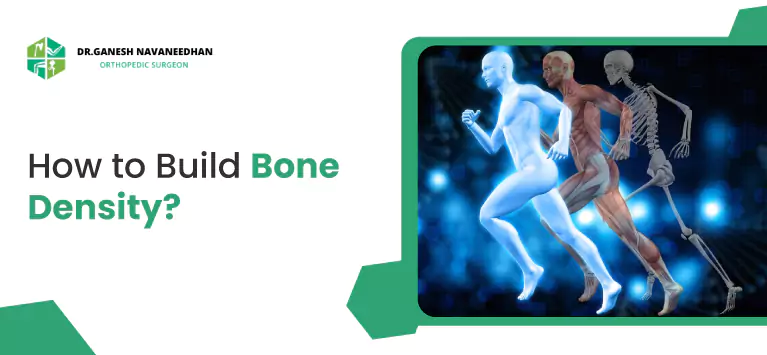- +91 62384 78716 +91 99475 78797
-
Sasthamangalam, Trivandrum
Sasthamangalam, Trivandrum

Building bone density is essential for overall health and preventing issues like osteoporosis. Many people don’t realize that our bones are living tissues that can constantly grow and change. Incorporating certain lifestyle habits and practices can help strengthen your bones and increase their density. This blog post will explore various ways to build bone density.
Bone density refers to the mineral content in your bones, particularly calcium and phosphorus. Healthy bone density is crucial because it helps prevent fractures and injuries, especially as you age. Low bone density can lead to conditions like osteoporosis, which weakens the bones and makes them more prone to fractures.
“How to build bone density?” Do you have this question? Here are some ways to build and increase bone density:
One of the most critical factors in building bone density is a balanced diet rich in calcium and vitamin D. Calcium is essential for bone health. It is found in dairy products, leafy green vegetables, tofu, and fortified foods. Vitamin D, which is found in sunshine, fatty fish, and fortified meals, aids in the body’s absorption of calcium.
Weight-bearing exercises are crucial for building bone density as they stress the bones, making them stronger. Activities like walking, running, dancing, and weightlifting improve bone health. Make an effort to work out with weights for at least 30 minutes on most days of the week.
Smoking and excessive alcohol consumption can have a negative impact on bone density. Smoking reduces blood flow to the bones, while alcohol interferes with the body’s ability to absorb nutrients needed for bone health. Quitting smoking and limiting alcohol intake can help improve bone density.
Getting enough sleep is essential for overall health, including bone density. During sleep, the body repairs and rebuilds tissues, including bone tissue. Aim for 7-9 hours of quality sleep each night to support healthy bones.
Chronic stress can increase the production of cortisol, a hormone that can negatively impact bone density. Finding ways to reduce stress, such as meditation, yoga, or deep breathing exercises, can help support healthy bones.
In addition to calcium and vitamin D, magnesium and vitamin K are essential for bone health. Magnesium helps regulate calcium levels in the body, while vitamin K is necessary for bone formation. Foods like nuts, seeds, whole grains, and leafy green vegetables are good magnesium and vitamin K sources.
If you have trouble getting enough calcium, vitamin D, magnesium, or vitamin K from your diet, consider taking supplements. Talk to your healthcare provider before starting new supplements to ensure they are safe and appropriate.
Drinking adequate water is essential for overall health, including bone density. Dehydration can affect bone mineral density, so stay hydrated by drinking water throughout the day.
Maintaining optimal bone health is essential for reducing your risk of osteoporosis and ensuring a solid and vital skeletal system throughout your life. Regular exercise is one of the most effective ways to build and maintain bone density. Here are some exercises to increase bone density
Checking your bone density regularly is essential for strong bones. Get bone density scans and talk to a doctor about the results. They can advise based on your needs and help you understand how to keep your bones healthy. If you’re worried about your bone health or have osteoporosis, seeing a healthcare provider is vital. They can review your results, check your overall bone health, and suggest lifestyle changes, diet, or treatments to keep your bones strong.
The time frame for improving bone density can vary depending on factors such as age, overall health, and the severity of bone loss. On average, it can take approximately 6 to 18 months of consistent treatment and lifestyle modifications to see improvements in bone density. However, it is important to remember that bone density improvement is a gradual process, and it may take longer for individuals with more severe bone loss or certain medical conditions.
Building bone density is a gradual process that requires a combination of proper nutrition, exercise, and lifestyle habits. Incorporating these simple and realistic strategies into your daily routine can help strengthen your bones and reduce the risk of osteoporosis. Remember that improving your bone health is always possible, so take the first step to building strong and healthy bones today.
Copyright © 2025 Dr. Ganesh Navaneedhan. All Rights Reserved. | Designed By Harvee healthcare